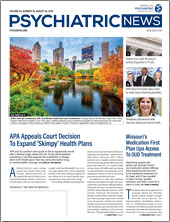A network meta-analysis published in JAMA Psychiatry that compared various treatment strategies for posttraumatic stress disorder (PTSD) concluded that while psychotherapy and medications are comparable in the short term, a psychotherapy-based approach is superior to medication in the long term. The study findings support the conclusions of many professional guidelines, which recommend psychotherapy as the frontline treatment for PTSD, with medications as a secondary option.
As noted in an accompanying editorial, however, the data underlying this analysis were based on just 12 studies—many with a small number of participants—which highlights the need for more clinical studies of patients with PTSD.
Investigators from the University of Basel in Switzerland and the University of Freiburg in Germany identified 12 randomized, controlled studies (922 total participants) that compared at least two active PTSD treatments: psychotherapy, pharmacotherapy, or a combination of the two. Prolonged exposure therapy—a technique in which patients with PTSD relive their trauma in a safe, controlled setting—was the most common psychotherapy intervention, and the antidepressant sertraline was the most common medication tested. Other treatments included in the 12 studies were cognitive-behavioral therapy (CBT), the antidepressant paroxetine, the antidepressant fluoxetine, and the psychedelic MDMA (3,4-methylenedioxymethamphetamine, also known as ecstasy).
Using a network meta-analysis approach—which uses statistical tools to directly and indirectly compare studies that use different treatments—the researchers found that no treatment strategy (psychotherapy, medication, or combination) was superior to the others at improving PTSD symptoms during the treatment period (up to 24 weeks). They also did not uncover any differences in patient acceptability—a measure of how likely a patient might be to drop out of a study—between psychotherapy or pharmacotherapy.
However, an analysis of long-term data (up to one year following the end of the trial) found that psychotherapy or interventions that combined psychotherapy and medication were superior to medication alone for PTSD symptom improvement. (A combination regimen was slightly more effective than psychotherapy alone, but the difference was not statistically significant.)
“Our results confirm the recommendations of many treatment guidelines—that psychotherapeutic treatments should be preferred as first-line treatments,” the authors wrote. “We found limited evidence to recommend pharmacological treatments as monotherapies, when sustained and long-term symptom improvement is intended.” However, the authors also cautioned that only six of the 12 included studies had long-term data, so the conclusions are somewhat constrained.
“For a disorder widely acknowledged as an important public health problem, the lack of PTSD trials, particularly ones evaluating pharmacotherapies, is troubling,” noted Murray Stein, M.D., M.P.H., and Sonya Norman, Ph.D., of the University of California, San Diego, in a JAMA Psychiatry editorial accompanying the study. “Equally concerning is the size of the trials that have been funded, ranging from tiny (e.g., tens of participants) to small (e.g., fewer than 300 participants) by the standards of clinical trials in other disease states.”
Norman and Stein noted that smaller-scale trials can help identify the efficacy of novel treatments when compared with placebo. However, larger trials are needed for precision medicine studies; that is, identifying if a patient is more likely to benefit from psychotherapy or an antidepressant. They also noted that combining all psychotherapies and all medications into two large pools complicates any interpretation about which approach is superior.
The study authors reported no funding information for this analysis. ■
“Comparative Efficacy and Acceptability of Pharmacological, Psychotherapeutic, and Combination Treatments in Adults With Posttraumatic Stress Disorder: A Network Meta-Analysis” is posted
here. “When Does Meta-Analysis of a Network Not Work? Fishing for Answers” is posted
here.
